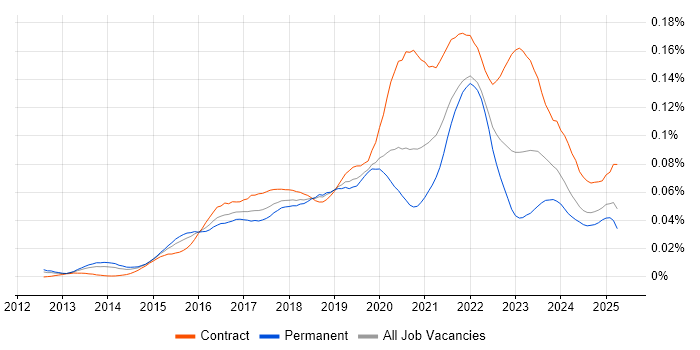Minimum Viable Product
UK
The table below provides summary statistics for contract job vacancies requiring Minimum Viable Product skills. It includes a benchmarking guide to the contractor rates offered in vacancies that cited Minimum Viable Product over the 6 months leading up to 1 May 2025, comparing them to the same period in the previous two years.
| 6 months to 1 May 2025 |
Same period 2024 | Same period 2023 | |
|---|---|---|---|
| Rank | 497 | 540 | 598 |
| Rank change year-on-year | +43 | +58 | +100 |
| Contract jobs citing Minimum Viable Product | 23 | 42 | 120 |
| As % of all contract jobs advertised in the UK | 0.079% | 0.096% | 0.20% |
| As % of the Processes & Methodologies category | 0.086% | 0.11% | 0.22% |
| Number of daily rates quoted | 15 | 22 | 95 |
| 10th Percentile | £348 | £366 | £409 |
| 25th Percentile | £409 | £506 | £440 |
| Median daily rate (50th Percentile) | £450 | £575 | £450 |
| Median % change year-on-year | -21.74% | +27.78% | -15.69% |
| 75th Percentile | £531 | £625 | £628 |
| 90th Percentile | £610 | £638 | £650 |
| UK excluding London median daily rate | £463 | £538 | £440 |
| % change year-on-year | -13.86% | +22.16% | -9.28% |
All Process and Methodology Skills
UK
Minimum Viable Product falls under the Processes and Methodologies category. For comparison with the information above, the following table provides summary statistics for all contract job vacancies requiring process or methodology skills.
| Contract vacancies with a requirement for process or methodology skills | 26,594 | 37,597 | 53,655 |
| As % of all contract IT jobs advertised in the UK | 90.84% | 86.31% | 89.91% |
| Number of daily rates quoted | 17,149 | 24,227 | 37,238 |
| 10th Percentile | £308 | £300 | £325 |
| 25th Percentile | £413 | £413 | £438 |
| Median daily rate (50th Percentile) | £520 | £525 | £550 |
| Median % change year-on-year | -0.95% | -4.55% | +4.76% |
| 75th Percentile | £630 | £638 | £650 |
| 90th Percentile | £743 | £750 | £750 |
| UK excluding London median daily rate | £483 | £500 | £500 |
| % change year-on-year | -3.50% | - | +5.26% |
| Number of hourly rates quoted | 1,071 | 2,443 | 1,746 |
| 10th Percentile | £14.41 | £12.75 | £11.00 |
| 25th Percentile | £18.21 | £16.00 | £16.25 |
| Median hourly rate | £29.00 | £35.65 | £37.30 |
| Median % change year-on-year | -18.65% | -4.42% | +49.20% |
| 75th Percentile | £60.38 | £59.98 | £65.00 |
| 90th Percentile | £75.00 | £72.50 | £75.00 |
| UK excluding London median hourly rate | £27.50 | £37.34 | £36.00 |
| % change year-on-year | -26.35% | +3.72% | +80.00% |
Minimum Viable Product
Job Vacancy Trend
Job postings citing Minimum Viable Product as a proportion of all IT jobs advertised.

Minimum Viable Product
Contractor Daily Rate Trend
3-month moving average daily rate quoted in jobs citing Minimum Viable Product.
Minimum Viable Product
Daily Rate Histogram
Daily rate distribution for jobs citing Minimum Viable Product over the 6 months to 1 May 2025.
Minimum Viable Product
Contractor Hourly Rate Trend
3-month moving average hourly rates quoted in jobs citing Minimum Viable Product.
Minimum Viable Product
Top 8 Contract Locations
The table below looks at the demand and provides a guide to the median contractor rates quoted in IT jobs citing Minimum Viable Product within the UK over the 6 months to 1 May 2025. The 'Rank Change' column provides an indication of the change in demand within each location based on the same 6 month period last year.
| Location | Rank Change on Same Period Last Year |
Matching Contract IT Job Ads |
Median Daily Rate Past 6 Months |
Median Daily Rate % Change on Same Period Last Year |
Live Jobs |
|---|---|---|---|---|---|
| UK excluding London | +60 | 14 | £463 | -13.86% | 5 |
| England | +38 | 14 | £450 | -21.74% | 10 |
| Work from Home | +37 | 11 | £457 | -26.96% | 5 |
| London | +24 | 7 | £370 | -37.11% | 6 |
| Scotland | +14 | 7 | £431 | -21.64% | 1 |
| South West | +47 | 5 | £638 | +6.25% | 1 |
| East of England | - | 1 | £475 | - | 1 |
| Wales | - | 1 | £575 | - |
Minimum Viable Product
Co-occurring Skills and Capabilities by Category
The follow tables expand on the table above by listing co-occurrences grouped by category. The same employment type, locality and period is covered with up to 20 co-occurrences shown in each of the following categories:
